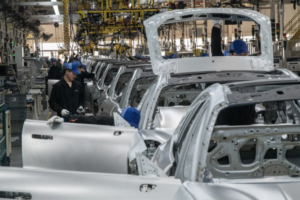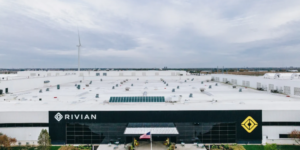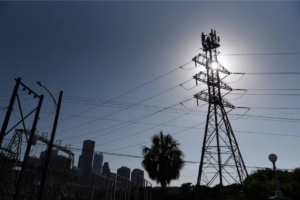U.S Electric Vehicle Tariffs
 Credit: Gilles Sabrie for The New York Times
Credit: Gilles Sabrie for The New York Times
The Biden administration instituted a 100% tariff on Chinese electric vehicles (and also increased tariffs on solar cells). For now, the US market is protected from Chinese EVs, but this is not a stable equilibrium.
At the same time, the final guidance for electric vehicle tax credits issued by the administration is not as restrictive as it could have been regarding the Chinese supply chain (although this is presumably to benefit U.S. automakers rather than Chinese suppliers).
Interestingly, Volvo is out with a new small electric SUV, which will start at $35,000 in the US. Volvo is now owned by a Chinese automaker (Geely) and manufactures the vehicle in China, but because of Volvo’s US manufacturing base, the cars won’t get hit with the new tariff (although they won’t qualify for tax credits either – Hat tip to Trucks VC’s FoT on this interesting story). Chinese EVs in the US seem like a when, not if, situation. The geopolitical and economic tension between the US and China and how it impacts the energy transition is almost certainly the most important topic this year, and perhaps this decade.
Shoving Carbon Underground
Engineered carbon removal financier Frontier Climate recently made news with a large commercial deal with the company Vaulted Deep. The company is essentially injecting biomass waste underground to sequester its embodied carbon.
I think this is incredibly interesting. It has good bayesian priors – this is a spinoff of a company that does waste injection wells for the oil and gas industry, so presumably they know what they are doing, and can hire from a qualified workforce. In addition, it can use existing infrastructure, low-case regionally sourced materials, and isn’t energy intensive (I am biased; these three reasons are similar reasons to why Evergreen decided to invest in Aquarry).
Normal Electric Vehicle Manufacturing
 Credit: Electrek
Credit: Electrek
The State of Illinois provided $827 million in incentives to Rivian to build their next vehicle (the R2) in Normal, Illinois (where Rivian is already producing their R1 vehicles. This is part of a downsizing of Rivian’s plans to set up a new manufacturing facility in Georgia, but means they can get production in place sooner. If you are looking for an economic development word cloud of the state of Illinois, it is ‘electric vehicles supply chain; quantum.’
Superfired
Last month we mentioned how Tesla fired its entire supercharger team. However, this now sounds like it was more a function of Musk’s personal approach than a strategic decision – the company is reportedly hiring some of the staff back – so likely more of a speed bump than a pivot.
Wires Rule!
 Credit: Reuters/Callaghan O’Hare
Credit: Reuters/Callaghan O’Hare
The Federal Energy Regulatory Commission (FERC) issued new rules on transmission policy to help better align incentives and advance the development of transmission projects (which we’ll need a lot more of to accommodate growing renewables generation). Essentially, this will require a coherent process for the new reality we live in, with many geographically disparate generation sites.
This is a significant and positive change; it will create a defined cost allocation mechanism (that will help hammer out how projects that improve the grid get paid for); enable FERC to approve projects when states can’t or won’t approve interstate projects (because the rules in place at the state level were written for a different time); it will be challenged in court, and even if successful will take a long time to implement.
Carbon Offset Guidance
The Biden administration issued federal guidance for carbon offsets. I’ll be curious to see whether this ends up moving the needle. I hope it does, although I am skeptical that it can without more stringent enforcements/requirements to clear out the low end of the market. That said, just because this market is a mess right now doesn’t mean that leveraging nature based solutions (via offsets) can’t be an important part of the mix in the future.
FESI
The new DOE foundation, Foundation for Energy Security and Innovation, launched. It creates more flexibility for the DOE to support commercialization efforts, engage with the private sector, and fund cross-cutting initiatives. Shout out to Evergreen board member Noelle Laing, who is on the Foundation’s board.